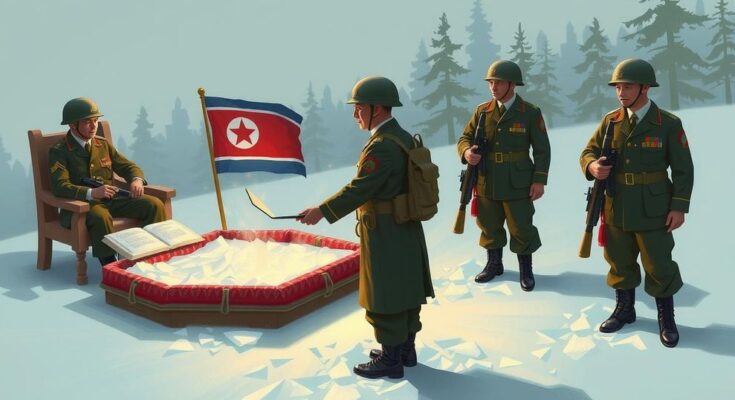Ukrainian President Volodymyr Zelensky announced his willingness to exchange two captured North Korean soldiers for Ukrainian prisoners of war in Russia. The North Korean soldiers, captured on January 9 and currently in Kyiv, may have been misidentified by Russian forces. Reports suggest North Korea’s substantial military involvement in the conflict, raising concerns about the treatment of captured personnel and geopolitical ramifications.
Ukrainian President Volodymyr Zelensky has expressed his readiness to exchange two captured North Korean soldiers for Ukrainian prisoners held in Russia. According to Zelensky, options may be available for North Korean soldiers who opt not to return home, specifically those who wish to disseminate the truth about the conflict in Korean. The captured soldiers were apprehended on January 9 and are currently receiving medical care in Kyiv, with interrogation taking place in collaboration with the South Korean National Intelligence Service. Zelensky’s office asserts that the Russian authorities are attempting to disguise the soldiers’ North Korean identity by presenting them as individuals from regions under Moscow’s control, such as Tuva.
The Security Service of Ukraine’s statement indicated that one of the captured soldiers had a Russian military identification card wrongly assigned to another individual from the Tuva Republic. During questioning, he reportedly claimed that he was not dispatched to engage in combat against Ukraine but had joined North Korea’s preparations for training exercises instead. This assertion adds complexity to the current understanding of North Korean involvement in the conflict, supported by previous reports estimating the deployment of around 10,000 North Korean troops to Russia.
The United States, through the White House, has confirmed North Korean military assistance to Russia, with reports of significant casualties among North Korean forces. In December, South Korean intelligence noted the death of a soldier captured during support operations for Russia, further underlining the dire circumstances surrounding these personnel. In light of these developments, President Zelensky emphasized the critical dependency of the Russian military on support from North Korea during the ongoing conflict.
The conflict in Ukraine has drawn international attention, particularly regarding the involvement of foreign military forces. North Korea’s role has been highlighted by various reports suggesting that it dispatched troops to support Russian military operations. The complex dynamics include the North Korean military’s loyalty and their conditioning for combat missions which raises questions about their perceptions of the war. Moreover, the humanitarian aspect of wartime treatment and the status of prisoners of war is governed by the Geneva Convention, which mandates humane treatment and appropriate communication during interrogation. The statements made by President Zelensky also underscore Ukraine’s ongoing efforts to secure the return of its own captured soldiers, while navigating international military relations and geopolitical tensions.
The offer made by President Zelensky to exchange North Korean soldiers for Ukrainian prisoners reflects the intricate and evolving nature of the conflict in Ukraine. The situation sheds light on the implications of North Korean military involvement in Russia’s war efforts and the humanitarian issues surrounding captured soldiers. As international scrutiny continues, these developments may impact diplomatic relations and future military strategies for both Ukraine and North Korea.
Original Source: www.bbc.co.uk




